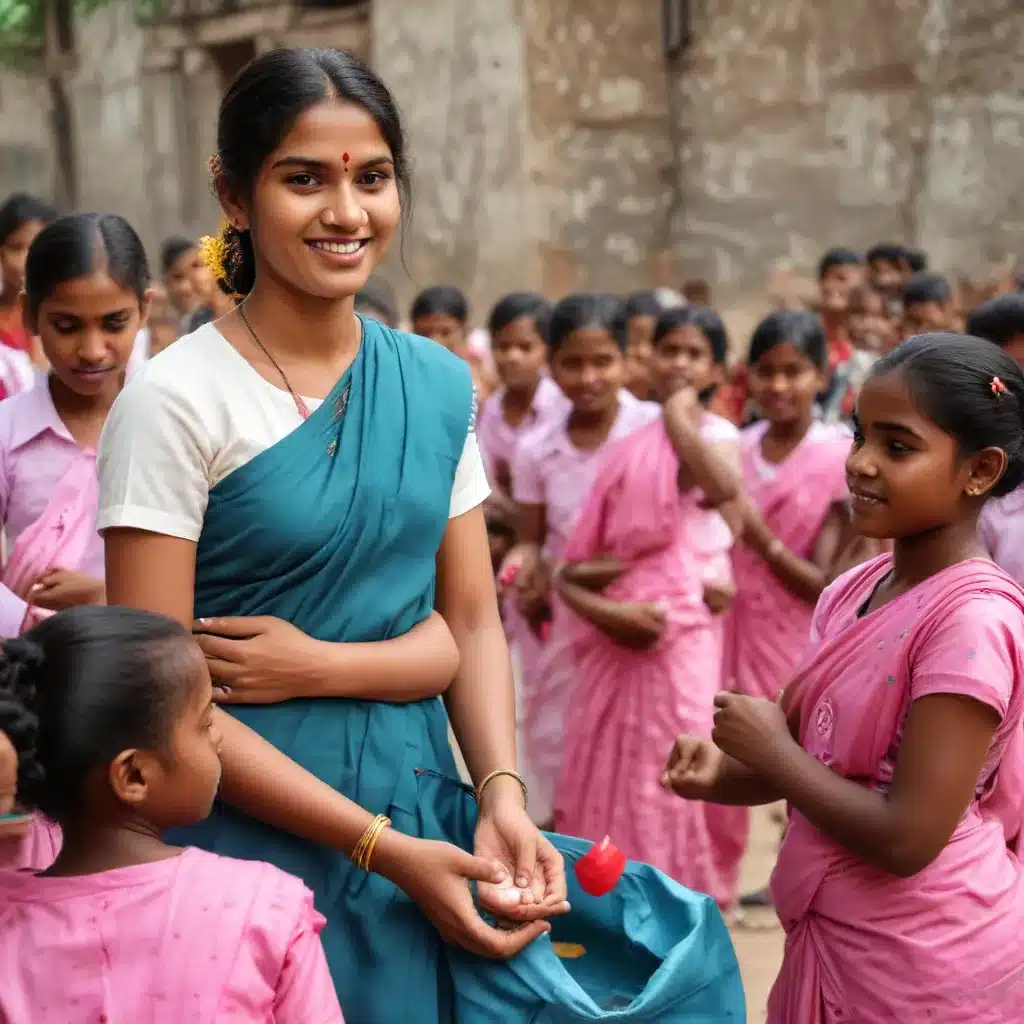
Promoting Menstrual Health and Hygiene through School-Based Interventions in Hyderabad Slum Communities
Empowering Adolescent Girls through Practical Guidance on Menstrual Management
Menstrual health and hygiene management (MHHM) is a critical public health and human rights issue that has gained increasing recognition globally. However, in India, the culture of silence surrounding menstruation perpetuates stigma, lack of awareness, and inadequate access to resources – leaving many adolescent girls unprepared to manage their menstruation with confidence and dignity.
One promising approach to address this challenge is through school-based interventions that provide practical guidance on the procurement, use, and disposal of menstrual products. This guidance can be delivered through two key mechanisms: interpersonal practical guidance (IPG) and mediated practical guidance (MPG).
IPG refers to face-to-face communication and discussions with key influencers like teachers, health workers, and peers. MPG, on the other hand, involves social and behavior change communication (SBCC) interventions that utilize print, digital, and media materials to share practical information.
A recent SBCC intervention called GARIMA, implemented in the slum communities of Hyderabad, Telangana, provides valuable insights into how these two forms of practical guidance can empower adolescent girls and improve their menstrual management knowledge, attitudes, and practices (KAP).
Addressing Gaps in Menstrual Health Knowledge and Practices
Baseline assessments in the GARIMA intervention areas revealed that over 90% of post-menarche girls were unaware of the need to wash menstrual cloths, 86% felt unprepared for menstruation, and 70% had low self-confidence in managing their periods. These findings are consistent with wider research in Uttar Pradesh, which found that only 57.7% of women aged 15-19 years used hygienic menstrual products.
To tackle these gaps, the GARIMA intervention utilized both IPG and MPG approaches:
Interpersonal Practical Guidance (IPG):
– Peer educator-facilitated girl group meetings
– One-on-one discussions with peer educators and health workers
– Mothers’ group meetings
– Small fathers’ group discussions
Mediated Practical Guidance (MPG):
– Girl group film and video screenings
– Informative storybooks and posters
By combining these strategies, the intervention aimed to break the silence around menstruation and equip adolescent girls with the knowledge and skills to manage their periods safely and hygienically.
Evaluating the Impact of Practical Guidance
An evaluation of the GARIMA intervention examined the independent and combined effects of IPG and MPG on adolescent girls’ menstrual management KAP. Some key findings include:
Knowledge:
– Girls who received both IPG and MPG had significantly better knowledge on how often to change menstrual products compared to those who received only IPG or no practical guidance.
– Receiving both forms of practical guidance also led to greater knowledge on the correct ultimate disposal of menstrual products.
Attitudes:
– While IPG and MPG did not significantly influence attitudes towards the convenience or embarrassment of procuring menstrual products, girls who received both forms of guidance were more likely to have positive attitudes towards the correct disposal of used products.
Practices:
– Adolescent girls who received both IPG and MPG had better practices related to the proper washing, drying, and storage of menstrual cloths or pads.
– They also reported more correct practices for the ultimate disposal of used menstrual products, such as burning, burying, or taking them to school.
These findings suggest that the combination of IPG and MPG is particularly powerful in improving adolescent girls’ menstrual management KAP. Receiving practical guidance through both interpersonal communication and mediated SBCC materials seems to have a synergistic effect, leading to more comprehensive and sustainable improvements.
Practical Implications and Considerations
The GARIMA intervention highlights the importance of utilizing multiple channels to deliver practical guidance on menstrual management. While IPG and MPG each have their own merits, the study shows that the greatest impact is achieved when they are implemented together.
Some key considerations for future school-based menstrual health interventions:
-
Targeting Knowledge and Practices, Not Just Attitudes: Practical guidance should focus on improving girls’ concrete knowledge and skills related to the procurement, use, and disposal of menstrual products, as attitudes may be more challenging to shift.
-
Ensuring Accurate and Consistent Information: IPG from informal sources like family and peers may not always provide correct, evidence-based guidance. Integrating MPG from expert-developed SBCC materials can help ensure adolescents receive accurate and consistent information.
-
Addressing Physical and Social Barriers: In addition to practical guidance, interventions should also tackle the physical barriers (e.g., lack of private facilities) and social barriers (e.g., menstrual stigma) that hinder effective menstrual management.
-
Engaging Multiple Stakeholders: Successful school-based menstrual health programs require the involvement of not just students, but also teachers, parents, and community leaders to create a supportive environment.
-
Monitoring and Evaluation: Continuous monitoring and evaluation of practical guidance delivery and its impact on KAP is crucial to refine interventions and ensure long-term sustainability.
By addressing these considerations, school-based menstrual health programs can empower adolescent girls, challenge harmful social norms, and ensure their fundamental right to manage their menstruation with safety, dignity, and confidence.
Conclusion
The GARIMA intervention in Hyderabad’s slum communities demonstrates the power of combining interpersonal and mediated practical guidance to improve adolescent girls’ menstrual management knowledge, attitudes, and practices. This innovative approach holds promise for replication and scale-up in other parts of India and beyond, as part of a comprehensive strategy to promote menstrual health and hygiene in schools and communities.
Ultimately, equipping adolescent girls with the right practical guidance, resources, and enabling environments is a critical step towards achieving gender equity and realizing their full potential. It is time to break the silence and stigma surrounding menstruation, and ensure that all girls can manage this natural process with dignity and ease.

